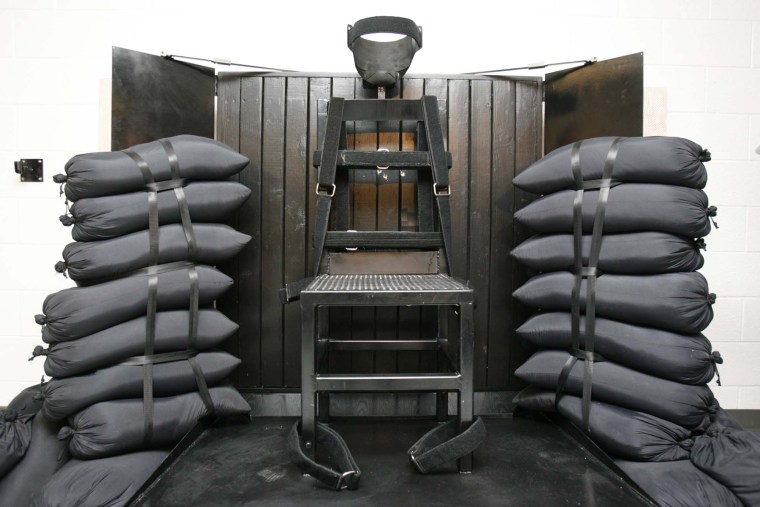Utah's Republican-controlled Legislature has approved a bill that would clear the way for executions by firing squad if the state can't find drugs to use in lethal injections.
It is unclear whether Republican Gov. Gary Herbert will sign or veto the measure. "Gov. Herbert does not commit to action on a bill until he has reviewed the final version that has passed both the House and the Senate. He is, however, willing to discuss the principles by which he evaluates legislation," a spokesperson for the governor told msnbc.
Herbert's decision is expected this month. If he signs the bill into law, Utah would become the only state to allow firing squads as a method for execution when there is a drug shortage. Some states have struggled with tracking down execution drugs amid a nationwide shortage.
RELATED: Utah Republican seeks return of executions by firing squad
State Rep. Paul Ray, the Republican who sponsored the bill, wasn't immediately available for comment. He has said the firing squad is more humane than lethal injection.
"We would love to get the lethal injection worked out so we can continue with that. But if not, now we have a backup plan," he told the Associated Press this week.
The Utah Legislature previously repealed the firing squad option in 2004, and lethal injection became the main method of execution, according to the Death Penalty Information Center (DPIC). But the state still authorizes the process for inmates who selected it before May 3, 2004. Oklahoma offers the procedure only if both lethal injection and electrocution are held unconstitutional.
For execution by firing squad, the sentenced person is usually bound to a chair with leather straps across the waist and head, according to an explanation of the procedure on the DPIC's website. Five shooters stand about 20 feet away and fire at the sentenced prisoner, according to DPIC.
Since 1976, three inmates have been executed by a firing squad, according to the DPIC. The first U.S. inmate executed this way after the U.S. Supreme Court reinstated the death penalty in 1976 was Gary Gilmore, killed in Utah in January 1977. Another Utahn inmate chose the method and died in January 1996. The most recent execution by firing squad was in Utah in June 2010 when five police officers shot Ronnie Lee Gardner, a convicted murderer.
There have been seven executions in Utah since 1976. Nine male Utahns remain on death row today.
Utahns for Alternatives to the Death Penalty and other critics of the procedure say reintroducing the firing squad will negatively affect the state's reputation for moral leadership, allow convicted murders to gain notoriety and cause a media frenzy.
RELATED: Oklahoma Republicans push for gas chamber as execution alternative
Several high-profile botched executions in Oklahoma and Arizona drew intense public scrutiny last year, and questions arose about new drug cocktails used in lethal injections. Officials in the 32 states that enforce the death penalty are scrambling to find new suppliers of lethal injection drugs after several pharmaceutical companies stopped carrying the medication because of criticism based on ethical concerns of the death penalty. In some cases, authorities have executed prisoners with drugs — often obtained in secrecy — never before used for the purpose.
Lethal injection involves using drugs like cyanide or midazolam. The U.S. Supreme Court has decided to take up a challenge over the use of midazolam, which was used recently in the problematic executions. The case focuses on whether the sedative effectively makes an inmate unconscious before officials administer the second and third drugs. Executions currently are on hold in Oklahoma, pending the justices' decision. But lawmakers are advocating for Oklahoma to become the first state in the country to execute death row inmates with nitrogen in a gas chamber.
